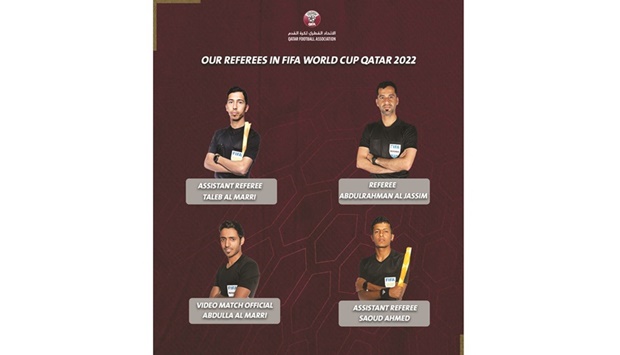Qatar’s Abdulrahman al-Jassim, Taleb al-Marri, Saoud Ahmed al-Maqaleh and Abdulla al-Marri were named in a list of match officials for the FIFA World Cup Qatar 2022, the sport’s governing body FIFA announced on Thursday. Also, for the first time ever there will be women referees at a men’s World Cup.
Al-Jassim is one of the 36 referees who will officiate at the tournament while Taleb and al-Maqaleh have been named among the 69 assistant referees. Abdulla al-Marri will be among the 24 Video Match Officials at Qatar 2022, which will be held from November 21 to December 18. Al-Jassim and Taleb have been part of the World Cup before, with the former being a Video Match Official at the 2018 tournament in Russia, while Taleb was an assistant referee at the same tournament.
For the first time in the history of the FIFA World Cup, the FIFA Referees Committee has also appointed three women’s referees and three women’s assistant referees. The referees are Stephanie Frappart from France, Salima Mukansanga from Rwanda and Yoshimi Yamashita from Japan. Neuza Back from Brazil, Karen Diaz Medina from Mexico and Kathryn Nesbitt from the USA are the assistants.
“We are very happy that ... we have been able to call up female match officials for the first time in the history of a FIFA World Cup,” said FIFA referees Committee chairman Pierluigi Collina.
“This concludes a long process that began several years ago with the deployment of female referees at FIFA men’s junior and senior tournaments. In this way, we clearly emphasise that it is quality that counts for us and not gender. I would hope that in the future, the selection of elite women’s match officials for important men’s competitions will be perceived as something normal and no longer as sensational.”
Frappart became the first female official to be involved in European Championship matches after UEFA included her in the list of referees for the tournament last year. FIFA said the match officials were selected based on their quality and the performances delivered at FIFA tournaments as well as at other international and domestic competitions in recent years.
“As always, the criteria we have used is ‘quality first’ and the selected match officials represent the highest level of refereeing worldwide,” said Collina. “The 2018 World Cup was very successful, partly because of the high standard of refereeing, and we will do our best to be even better in a few months in Qatar.”
The “Road to Qatar 2022” project started already in 2019, with more than 50 trios considered possible candidates and going through intensive preparation. Due to the Covid-19 pandemic, however, this preparation was anything, but easy, as in-presence activities were suspended for a long period.
“The pandemic affected our activities, in particular in 2020 and at the beginning of 2021. Luckily, the World Cup was still quite far, and we had enough time to provide the candidates with good preparation. We are announcing these selections well in advance as we want to work even harder with all those who have been appointed for the FIFA World Cup, monitoring them in the next months. The message is clear: don’t rest on your laurels, keep working hard and prepare yourselves very seriously for the World Cup,” said Collina.
Massimo Busacca, FIFA’s Director of Refereeing, ensures the match officials will receive all the necessary support by FIFA, as their preparation is paramount. “Thanks to an innovative tracking and support programme, all the match officials can be supervised by FIFA referees’ instructors even more closely and intensively than in previous years. This is a very important factor, from which we expect considerable improvements and progress in view of the FIFA World Cup 2022,” explained Busacca.
“In addition to that, there will be tailor-made individual programmes, in particular concerning health and fitness. Each match official will be carefully monitored in the next months with a final assessment on technical, physical and medical aspects to be made shortly before the World Cup, in order to have them in the best conditions when the ball starts rolling in Qatar.”
The selected match officials will participate in early summer in several seminars (Asuncion, Madrid and Doha), reviewing and analysing video clips of real match situations, and taking part in practical training sessions with players, which will be filmed to enable participants to receive instant feedback from the instructors.
“The key focuses of the preparation remain protecting players and the image of the game, consistency, uniformity, reading the game from a technical and tactical perspective and understanding a variety of player and team mentalities,” added Busacca. “We can’t eliminate all mistakes, but we will do everything we can to reduce them.”
The VAR system was implemented for the first time ever at the 2018 FIFA World Cup Russia and four years later, a team of 24 video match officials (VMOs) will operate in Qatar, ready to provide their teammates on the pitch with technological support, if needed.
Due to the very limited number of FIFA member associations having implemented the VAR system at the time, VMOs for Russia 2018 were mainly selected from Europe and South America. Today, the VAR system is used in all major competitions worldwide and VMOs from Asia, Africa, as well as Central and North America will also participate in the FIFA World Cup Qatar 2022.

Qatar’s Abdulrahman al-Jassim, Taleb al-Marri, Saoud Ahmed al-Maqaleh and Abdulla al-Marri were named in a list of match officials for the FIFA World Cup Qatar 2022, the sport’s governing body FIFA announced on Thursday.
